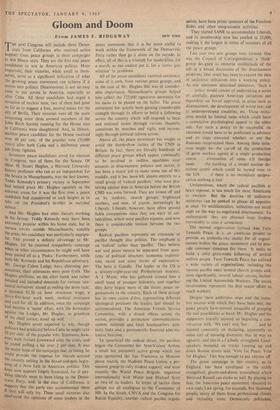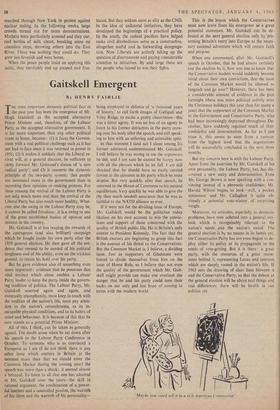Gloom and Doom
From JAMES F. RIDGEWAY NEW YORK THE next Congress will include three Demo- crats from California who received active support from peace groups in their campaigns to win House seats. They are the first real peace candidates to win in American politics. More important, their victories, while small in them- selves, serve as a significant indication of what the growing peace movement can achieve if it moves into politics. Disarmament is not an easy issue to put across in America, especially so after Cuba. All three candidates had urged a cessation of nuclear tests; two of them had gone so far as to suggest a free, neutral_ status for the city of Berlin. Their victories were all the more interesting since three avowed members of the John Birch Society running for the House also in California were slaughtered. And, in Illinois, another peace candidate for the House received over 40 per cent. of the popular vote (70,000 votes) after both Cuba and a deliberate smear job from rightists.
Seventeen peace candidates stood for election to Congress, two of them for the Senate. Of these, H. Stuart Hughes, a Harvard University history professor who ran as an independent for the Senate in Massachusetts, was the best known. Teddy Kennedy's primary victory in September had helped place Mr. Hughes squarely in the national arena for it was the first time a peace candidate had manoeuvred to such heights as to take on the President's brother in national debate.
And Mr. Hughes had other factors working in his favour. Teddy Kennedy may have been extremely popular within his home state, but in certain circles outside Massachusetts, notably the press, his candidacy was particularly unpopu- lar. This proved a definite advantage to Mr. Hughes. for he received sympathetic coverage when in other circumstances he might well have been passed off as a `Pinko: Furthermore, while both Mr. Kennedy and his Republican adversary, Mr George Cabot Lodge, have charming per- sonalities, their utterances were pure froth. The Hughes platform, on the other hand, was rather detailed and included demands for various 'uni- lateral initiatives' aimed at ending the arms race; a national $1.50 an hour minimum wage; a thirty-five-hour work week, medical insurance and care for all. In addition, since the campaign had become a `name' affair, with the Kennedys against the Lodges, Mr. Hughes. as grandson of the chief justice, stood up well.
Mr. Hughes never expected to win, though Pollsters had predicted before Cuba he might take 10 per cent. of the popular vote. Estimates, how- ever, were revised downward after the crisis. and he ended polling a bit over 2 per cent. It was the major hope of the campaign that, in losing, he Could provide the impetus for liberals around the country uniting in the blood-and-guts begin- ning of a New Left in American politics. This hope now appears largely frustrated, for if any- thing liberals seem to have clung to the Demo- cratic Party, and, in the case of California. it suggests that the party can accommodate them if they will only try. These small victories also reinforced the opinions of some leaders in the peace movement that it is far more useful to work within the framework of the Democratic Party rather than go it alone on the outside. In effect, all of this is a triumph for moderation, for a search, as one analyst put it, for a 'status quo solution' to problems.
All of the peace candidates received assistance, some of it cash, from various peace groups, and in the case of Mr. Hughes this was of consider- able importance. Massachusetts groups helped him collect the 125,000 signatures necessary for his name to be placed on the ballot. The peace movement has quietly been gaining considerable strength through its efforts to build a following across the country which will respond to local and national issues through various channels.• sometimes by marches and vigils, and increas- ingly through political reform action.
Above all, the peace movement has sought to avoid the dumb-show tactics of the CND in Britain. In fact, there are literally hundreds of different peace groups which appear continually to be involved in endless squabbles over nuances in disarmament policies and tactics. It has been a major job to make sense out of this muddle, and it has been left almost entirely to a small group of 'radical pacifists: who were pro- testing against tests in America before the British CND was even formed. They are joined oft and on by students, church groups, frightened mothers, and now, of course, increasingly by Liberals. Liberals, however, have often proved fickle companions since they are wary of uni- lateralism, which most pacifists espouse. and now there is considerable tension between the two groups.
Radical pacifism represents an extension of pacifist thought into politics. The emphasis is on `radical' rather than 'pacifist.' they believe war and peace cannot be separated from ques- tions of political structure, economic exploita- tion, racial and other forms of exploitation. The hero is Gandhi. The leader in the US is a seventy-eight-year-old Presbyterian minister, A. J. Muste, who has gathered around him a small band of younger followers, and together they have begun most of the major peace or- ganisatiobs in the country. Each of these groups has its own raison d'etre, representing different ideological positions the leaders feel should be accommodated. The American Friends Service Committee, with a dozen offices across the nation, provides a permanent communications system, national and local headquarters, pub- licity links and a permanently financed adm.nis- trative function.
To spearhead the radical thrust, the pacifists began the Committee for Non-Violent Action, a small but extremely active group which last year sponsored the San Francisco to Moscow peace march; the Students Peace Union, a per- manent group to rally student support; and most recently the World Peace Brigade, organised internationally with Muste and Michael Scott as two of its leaders. In terms of tactics these groups are all analogous to the Committee of 100. In the South, CNVA and the Congress for Racial Equality, another radical pacifist organi-
sation, have been prime sponsors of the Freedom Rides and other integrationist activities.
They started SANE to accommodate Liberals, and its membership now has swelled to 25,000, making it the largest in terms of numbers of all the peace groups.
Last year two new groups were formed. One was the Council of Correspondence, a 'think' group des gned to immerse intellectuals of the left in a broad discussion of the disarmament problems. One result has been to expand the idea of unilateral initiatives into a working policy. As one statement described initiatives, 'Such a . . . policy would consist of undertaking a series of carefully planned American initiatives not dependent on Soviet approval, in areas such as disarmament, the development of world law, aid to underdeveloped countries, etc. These initia- tives would be limited steps which could have a cumulative psychological appeal to the other side. For such a policy to be successful, its rationale would have to be publicised in advance and its steps executed whether or not the Russians reciprocated them. Among these inita- tives might be—the cut-off of the production of germ warfare agents at a single production centre . . elimination of some US foreign bases the builddng of a model nuclear de- tection centre which could be turned over to the UN if there is no immediate recipro- cation nothing is lost.'
Unilateralism, which the radical pacifists at heart espouse, is too much for most Americans to swallow But the doctrine of unilateral initiatives can be cooked to please all appetites at once To multilateralists, initiatives are small steps on the way to•negotiated disarmament. To unilateralists they are planned steps leading irrevocably to total d sarmament
The second organisation formed was Turn Towards Peace. It is an ambitious project to provide an umbrella-like shelter for all organi- sations within the peace movement and to pro- vide common direction for them It seeks to build a solid grass-roots following of several million people. Turn Towards Peace has enlisted a wide variety of organisations, including the various pacifist ones, several church groups and, most significantly, several labour unions, includ- ing the United Automobile Workers. The union involvement represents the first major effort to reach workers.
Despite these ambitious steps and the tenta- tive success with which they have been met, the peace people have seemed incapable of grasping the real possibilities at hand. Mr. Hughes and his supporters literally insisted on beginning a con-
versation with, 'We can't win, but . .', and he insisted constantly on declaring, apparently as some sort of amusing diversion. that he was an agnostic, and this in a Catholic stronghold. Loud- speakers mounted on trucks running up and down Boston streets said, 'Vote for Peace. Vote for Hughes.' This was enough to put anyone off.
The peace campaign in this country, as in England, has been enveloped in the sickly evangelical, gloom-and-doom atmosphere which Bertrand Russell can evoke so well. By playing on fear, the American peace movement obscured its own ends. Last spring, for example, five thousand people, many of them from professional classes and including some Democratic politicans, marched through New York in protest against nuclear testing. In the following weeks, large crowds turned out for more demonstrations. Mothers were particularly aroused and they ear-, tied bottles of milk about, breaking some on consulate steps, throwing others into the East River. There was nothing they could do. They grew less feverish and went home.
When the peace people insist on applying this tactic, they inevitably end up pooped and frus- trated. But they seldom seem as silly as the CND. In the idea of unilateral initiatives, they have developed the beginnings of a practical policy. In the south, the radical pacifists have helped make civil disobedience serve as a constructive, altogether useful tool in forwarding desegrega- tion. Now Liberals are actively taking up the question of disarmament and paying considerable attention to initiatives. By and large these are the people who intend to win their fights.































 Previous page
Previous page